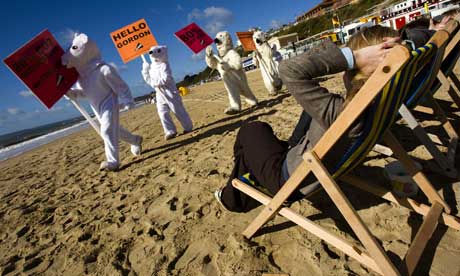
Climate change protesters on the beach at Bournemouth. Photograph: Stop Climate Chaos
Gordon Brown has insisted that global climate change can be limited to 2C and called on the US to accept binding targets to limit its carbon pollution.
In a letter to Stop Climate Chaos, a coalition of green groups, the prime minister said "all developed countries" needed to commit to reduce emissions to tackle the problem.
"Climate change poses the most urgent challenge to humankind - a challenge that threatens not only the environment, but international peace, security, prosperity and development," he wrote.
The letter was the first significant statement on climate change from Mr Brown since he became prime minister.
It came ahead of a key week of talks on developing a new international treaty, to succeed the Kyoto Protocol in 2012, to limit greenhouse gas emissions.
The UN will today hold a special high-level session on the issue in New York, attended by more than 70 heads of state.
The talks are intended to secure political commitment and build momentum for the UN climate change conference, taking place in Bali in December, where negotiations for the new international treaty will start.
Hilary Benn, the UK's environment, food and rural affairs secretary, is expected to attend.
"Bali must advance a negotiating agenda to combat climate change on all fronts, including adaptation, mitigation, clean technologies, deforestation and resource mobilization," the UN secretary general, Ban Ki-moon, said.
Prior to today's meeting, the conservation group WWF called on the UN to negotiate within the UN framework convention on climate change to achieve an "ambitious comprehensive climate agreement", which sets clear targets to reduce emissions, by no later than 2009.
"For world leaders to come together under the UN umbrella and to commit to deeper cuts in emissions is a watershed moment," Hans Verolme, the director of the WWF's global climate change programme, said.
Friends of the Earth urged the US and the rest of the world to focus on the UN process prior to a two-day meeting of the major emitting countries, taking place in Washington later this week.
The Washington meeting provoked controversy when the US president, George Bush, announced it earlier this year.
Critics claimed it was a diversionary tactic, and said the US was trying to sideline the separate UN process. The US insisted its efforts would help the UN agree the outline to a new treaty at Bali.
Privately, British officials say they are not yet convinced by the US, which remains opposed to binding targets and new international carbon trading markets.
Britain and Europe believe such measures are needed to draw developing nations such as China and India into a new deal.
"The EU has already agreed to reduce its greenhouse gas emissions by 30% by 2020…we want other developed nations to follow suit," Mr Brown said.
Ashok Sinha, director of I Count, the campaign of the Stop Climate Chaos coalition, welcomed the Prime Minister's aim to achieve a climate change agreement that will limit global warming to 2C.
But he called on Mr Brown to raise the target in the government's forthcoming climate change bill from a 60% reduction in CO2 emissions by 2050 to at least 80%, and to include aviation and shipping.
This is necessary in order to "meet the UK's moral obligation to play its fair share in the international effort to keep global warming under 2C," said Dr Sinha.

No comments:
Post a Comment